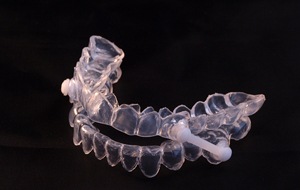Sleep Apnea Therapy – Enfield, CT
Breathe Easy Every Night
Getting an adequate amount of high-quality sleep each night is extremely important to your overall health. Unfortunately, obstructive sleep apnea (OSA) robs many people of the sleep they need to function and feel their best. Here at Four Town Dental, our dentists understand OSA and are qualified to offer oral appliance therapy to help patients find relief. Read on to learn more about OSA and how our team may be able to equip you to break free from it.
What Is Sleep Apnea Therapy?

How Does Oral Appliance Therapy Work?
 An oral sleep appliance resembles a mouthguard that you would wear for
sports. However, instead of aiming to protect the teeth, an oral sleep
appliance gently repositions the jaw at night, pulling it slightly forward.
This new positioning is able to prevent apneas for most patients with mild
to moderate OSA. Oral appliance therapy offers a number of advantages over a
CPAP machine. For example, an oral appliance is quite small, never makes any
noise, and is portable enough to take anywhere.
An oral sleep appliance resembles a mouthguard that you would wear for
sports. However, instead of aiming to protect the teeth, an oral sleep
appliance gently repositions the jaw at night, pulling it slightly forward.
This new positioning is able to prevent apneas for most patients with mild
to moderate OSA. Oral appliance therapy offers a number of advantages over a
CPAP machine. For example, an oral appliance is quite small, never makes any
noise, and is portable enough to take anywhere.
Do You Need Sleep Apnea Therapy?
 If you are experiencing some or all of the following symptoms, it is
possible that you have OSA and would benefit from sleep apnea therapy:
If you are experiencing some or all of the following symptoms, it is
possible that you have OSA and would benefit from sleep apnea therapy:
- Loud, frequent snoring
- Insomnia or restless sleep
- Regularly waking up with a dry mouth and/or headache
- Daytime exhaustion
- Trouble concentrating
- Irritability and depression
Benefits of Sleep Apnea Therapy
 Soon after you begin sleep apnea therapy, you should notice a significant
improvement in your daily life. Your partner will be relieved that you no
longer snore, and you may be happier and more productive. OSA treatment also
offers long-term benefits. Regularly getting an adequate amount of
high-quality sleep will lower your risk of a number of serious health
problems, including heart attack, stroke, high blood pressure, and more. You
will also be at a reduced risk of being involved in a motor vehicle
accident.
Soon after you begin sleep apnea therapy, you should notice a significant
improvement in your daily life. Your partner will be relieved that you no
longer snore, and you may be happier and more productive. OSA treatment also
offers long-term benefits. Regularly getting an adequate amount of
high-quality sleep will lower your risk of a number of serious health
problems, including heart attack, stroke, high blood pressure, and more. You
will also be at a reduced risk of being involved in a motor vehicle
accident.
Cost of Sleep Apnea Therapy
 Oral appliances often cost less than a CPAP machine, and many types of
insurance cover sleep apnea therapy. When you visit us for your
consultation, we will give you upfront pricing information so you completely
understand your financial obligation. We can also help you apply for
affordable financing through CareCredit if necessary.
Oral appliances often cost less than a CPAP machine, and many types of
insurance cover sleep apnea therapy. When you visit us for your
consultation, we will give you upfront pricing information so you completely
understand your financial obligation. We can also help you apply for
affordable financing through CareCredit if necessary.
Are you ready to find out if oral appliance therapy is right for you? Contact Four Town Dental to learn more about this potentially life-changing treatment.
Sleep Apnea Therapy FAQs
Why Should I See a Dentist for Sleep Apnea Treatment?
At first, it might seem counterintuitive to visit a dentist for sleep apnea treatment. However, the truth is that dentists possess in-depth knowledge of the upper respiratory system, including the mouth, nose, and throat. They understand how various factors can affect nighttime breathing, and they can choose to undergo additional training that teaches them how to provide effective sleep apnea treatment in the form of oral appliance therapy.
Plus, since you see our team twice a year for routine cleanings and checkups, we are in an ideal position to notice signs of sleep apnea and encourage you to seek timely treatment.
Does Everyone Who Snores Have Sleep Apnea?
No, not everyone who snores has sleep apnea. While snoring is a common symptom of sleep apnea, it can also be caused by other factors such as allergies, nasal congestion, or the anatomy of the mouth and throat. It occurs when tissues in the throat vibrate as air moves past them. Sleep apnea, however, involves repeated pauses in breathing during sleep that can lead to serious health issues if left untreated.
Even though snoring and sleep apnea are separate issues, they can be related in many instances. That is because the same tissues that vibrate during snoring can also completely block the airway. If your snoring is loud, persistent, or accompanied by choking or gasping, it may be wise to consult a sleep specialist to find out if you have sleep apnea.
Can I Diagnose Sleep Apnea on My Own?
No, sleep apnea is not self-diagnosable. You need to undergo an official sleep test, overseen by a qualified specialist, in order to find out if you have sleep apnea and how severe the condition is.
However, it is still wise to monitor the quality of your sleep and keep track of potential sleep apnea symptoms. For example, you might use a smartwatch that can provide insight into your sleep quality. Or, you can keep a sleep journal that notes things like your bedtimes, wake times, your feelings each morning, and potential factors that affect sleep quality. Your medical care team can use that data to determine if you need a sleep test.
Will My Sleep Apnea Go Away If I Lose Weight?
Losing weight can have a significant positive impact on sleep apnea, especially for individuals whose condition is linked to excess body weight. Fat deposits around the neck and throat can narrow the airway, making it more likely to collapse during sleep. By shedding extra pounds, you may reduce the severity of your symptoms or, in some cases, eliminate mild sleep apnea altogether.
However, weight loss does not guarantee that sleep apnea will completely disappear, as other factors like genetics, anatomy, and age also play a role. It is important to discuss your treatment plan with a healthcare provider for the best results.
How Soon After Starting Sleep Apnea Treatment Will I Notice Improvement?
Many patients notice an improvement within the first few nights of using their oral appliance. However, it takes longer in some cases. Some people find that they accidentally eject their appliance during sleep or experience other temporary issues. If your appliance seems not to be working, consult with us. It might need to be adjusted.
The best way to know for sure if your treatment is working is to undergo an additional sleep test.
